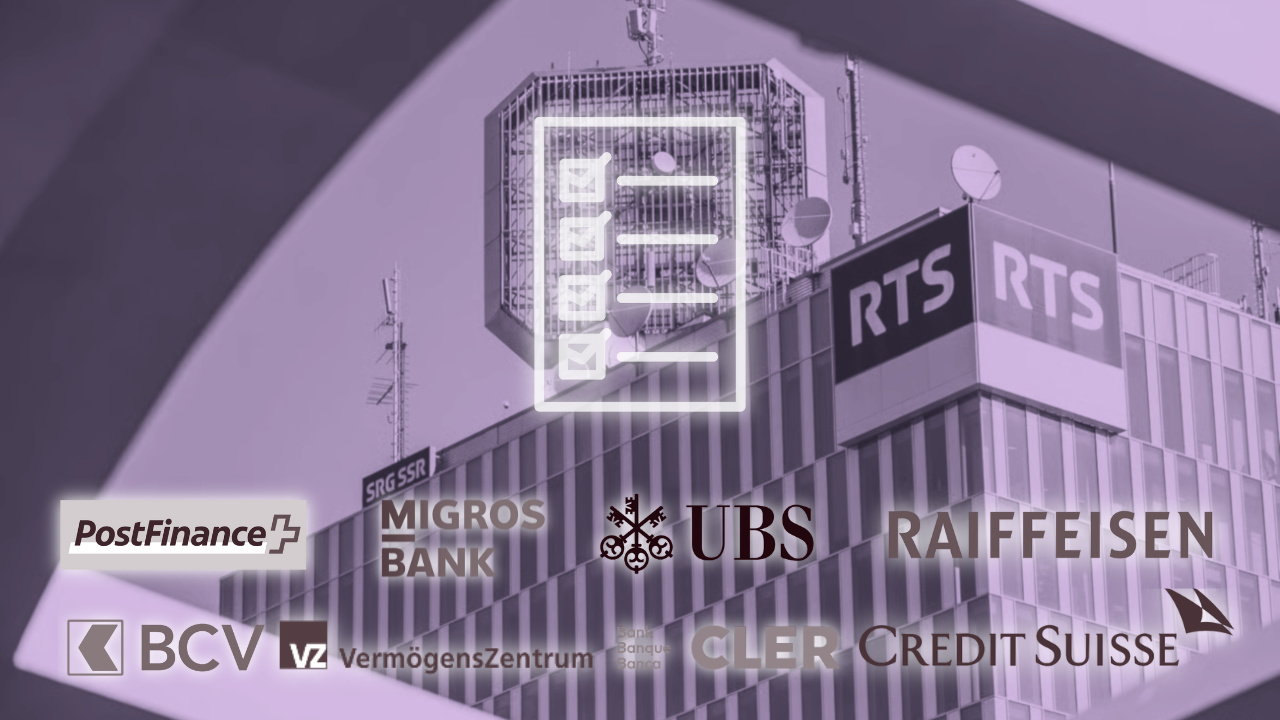
À bon entendeur conducted a survey of eight major Swiss banks to assess the relevance and transparency of the financial advice offered. The scenario presented by the RTS program was realistic: investing an amount of CHF 100,000 over a period of several years. The objective? To verify if banks uphold their promises of clarity and personalized recommendations.
This investigation is relevant to determine if traditional banks can truly be trusted or if it’s better to turn to other existing solutions in Switzerland. We will explore this.
Key Findings from the RTS Report “What are Banks’ Promises Worth?”
A Glaring Lack of Transparency Regarding Fees
One finding emerged from the investigation: none of the advisors met at these eight institutions spontaneously provided a complete and detailed list of fees associated with the proposed funds. Yet, these hidden fees, often overlooked during advice, directly impact the final profitability of investments. This opacity is problematic as it prevents investors from making informed choices and significantly reduces the real return on investments.
Often Generalized and Poorly Tailored Advice
The investigation reveals a clear disparity in the quality of advice provided. While the general principles of financial investments and risks were correctly explained, the personalization of advice is often insufficient.
At UBS , crucial topics such as sustainability or personal pension planning were not addressed, despite the official recommendations of the Swiss Bankers Association. The Banque Cantonale Vaudoise also proved too generalized, without sufficiently integrating the client’s personal situation.
Migros Bank, PostFinance, and Banque Cler stood out positively, thanks to a more in-depth approach tailored to personal and financial profiles and sustainability expectations.
Note: Banque Pictet was indeed contacted by the report’s team. But it refused to receive the investigator, explaining that the fictitious amount of CHF 100,000 did not meet its criteria. At Pictet, one must have at least 2 million francs to access wealth management services. This refusal clearly illustrates that some private banks only cater to very wealthy clients and remain outside the scope of this report’s analysis.
Read the Swiss Private Bank Guide 2025 for more information.
Practical Recommendations from À Bon Entendeur
In light of these findings, RTS reiterates the crucial importance of investment diversification. Spreading investments across multiple products and different financial institutions effectively reduces risk.
These results clearly raise the question: should we continue to favor traditional banks or explore the alternatives offered by neobanks? The rest of this article provides a comprehensive analysis of these digital alternatives.
Can You Invest Differently in Switzerland?
Considering Neobanks for Investing
Some Swiss neobanks now allow direct investment via their application. One can either fully delegate management (automated model) or buy securities oneself, sometimes starting from very small amounts. In all cases, fees are visible from the outset, and investment products are standardized, often limited to ETFs or a few Swiss and international stocks.
Five solutions available in Switzerland cover the essence of this offering: Alpian, Selma, Radicant, Neon, and Yuh. Each is distinguished by its investment approach, fee structure, and the level of autonomy left to the user.
Alpian Investment: Management with Human Support
At Alpian, you don’t choose the securities yourself. You first answer a questionnaire to define your risk profile. A portfolio is then proposed, built from diversified ETFs. Monitoring is ensured by experts, and if desired, you can communicate with an advisor via message or call.
- What you can do: follow strategy adjustments, ask specific questions to an advisor, adjust your allocation preferences.
- Strengths: personalized support, clear strategy, good fee transparency (0.75%/year).
- Limitations: no direct market access, no possibility to buy a specific asset yourself.
Read our full review of Alpian’s investment offering
Selma Investment: a 100% Automated Portfolio
With Selma, you entrust the entire management to an algorithm. After a digital exchange to understand your situation and objectives, a portfolio is automatically created and updated without intervention. No manual selection is possible.
- What you can do: adjust your risk profile, modify your investment horizon, modify your payments.
- Strengths: simple process, no investment knowledge needed, well-explained costs.
- Limitations: no direct action on portfolio composition, interface more functional than editorialized.
Radicant Investment: Aligned with Sustainable Development Goals
Radicant offers a hybrid model, focused on impact investing. You start by choosing themes (such as health, climate, or equality), which then guide the asset selection (thematic ETFs). Management is automated, but the client retains some freedom in the chosen orientations.
- What you can do: prioritize investment themes, track a social/environmental impact indicator, adjust overall risk exposure.
- Strengths: transparency on ESG criteria, simple structure, accessible design.
- Limitations: limited asset diversification offering, absence of advanced trading features, still uncompetitive fees.
Read our full review of Radicant’s investment offering
Neon Investment: Simplified Interface for Passive Investments
Neon allows investing via a partnership with True Wealth. You choose a risk level and an allocation strategy, then management is automated. It is also possible to manually buy some stocks or ETFs, but the offering remains limited.
- What you can do: start a recurring investment plan, buy some specific securities, choose a portfolio based on global or Swiss ETFs.
- Strengths: low fees (0.45%/year), direct integration with the Neon banking app, good simplicity/cost ratio.
- Limitations: restricted investment catalog, no fractional shares, no thematic management.
Read our full review of Neon’s investment offering
Yuh Investment: Access to Stocks and Cryptos from CHF 25
Yuh offers a public-friendly interface with a catalog of stocks, ETFs, and cryptos accessible from CHF 25. You can buy a fraction of a security, schedule regular purchases, and track your portfolio. The investment universe is limited, but the functions are well-designed.
- What you can do: buy a portion of a stock or ETF, invest automatically each month, track a simple performance evolution.
- Strengths: accessibility, clear interface, low entry amount.
- Limitations: limited choice, no ESG filter, absence of strategic support or advice.
Read our full review of Yuh’s investment offering
Comparison of Investment Solutions from Swiss Neobanks in 2025
To discover everything in detail, consult the guide to digital investment platforms in Switzerland. In the meantime, here is a quick comparison of the available solutions:
| Solution | Indicative Fees | Approach | Main Advantages | Main Limitations |
| Alpian | 0.75% / year | Semi-active management | Human advice, expert-defined strategy | No trading, min. deposit CHF 2,000 to CHF 30,000 |
| Selma | approx. 0.49% / year | Full robo-advisor | Full automation, no rebalancing needed | No choice on securities, no thematic ETFs |
| Radicant | 0.95% / year | Thematic ESG | Sustainable themes (climate, equality, health), managed allocation | No stocks, limited ETFs, high fees |
| Neon | 0.45% / year | Passive management (ETF) | Reduced fees, choice between Swiss or global ETFs | No fractional trading, no thematic selection |
| Yuh | Fees per transaction | Simplified manual purchase | Access from CHF 25, ETFs, stocks, cryptos | Fewer than 100 assets available, no defined strategy |
Conclusion: which Investment Advice to Trust?
The results of the RTS report show weaknesses in the advice offered by traditional banks. Conversely, Swiss neobanks provide a clear answer, with transparent models, and also limitations. But fees are known in advance, and accessibility adapted to different profiles is a welcome convenience.
The Right Choice Depends on your Priorities:
If you want to delegate everything without getting involved: Selma
If you want structured human advice: Alpian
If you invest in line with your values: Radicant
If you want a simple passive investment: Neon
If you are starting with small amounts: Yuh
To learn more, consult the updated comparison on heyneo.ch – Investment & Trading section.
Also read
- Private Banking in Switzerland: 5 Points to Watch out for to Avoid Unpleasant Surprises
- Swiss Private Banking: The 2025 Guide
What Solutions Have You Tested? Who should You Turn to for Investment Advice?
Share your feedback with all Neo’s friends 😈





